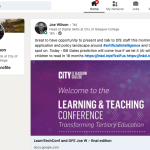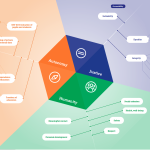Blog
Transforming Vocational Education and Training: Harnessing the Power of Digital Assessment
 Sad to say the eAssessment in Vocational Education and Training project, funded by the Erasmus+ programme and coordinated by Pontydsgu has come to an end. As far as we know it was the last Erasmus _ research and development project in the UK, with the end of June marking the end of the UKs involvement in the programme. The last piece of work undertaken in the project was to provide a Report and Policy Recommendations. The introduction to the report says how In recent years, the integration of digital technologies has revolutionised various sectors of society, and the field of […]
Sad to say the eAssessment in Vocational Education and Training project, funded by the Erasmus+ programme and coordinated by Pontydsgu has come to an end. As far as we know it was the last Erasmus _ research and development project in the UK, with the end of June marking the end of the UKs involvement in the programme. The last piece of work undertaken in the project was to provide a Report and Policy Recommendations. The introduction to the report says how In recent years, the integration of digital technologies has revolutionised various sectors of society, and the field of […]Getting Digital Assessment Right
 There is growing activity around eAssessment, largely driven it appears by concerns over AI and in particular Generative AI and large Language Models. On Thursday 15 June THE is holding a free webinar on the theme of 'Getting Digital Assessment Right.' Issues to be discussed, they say are" Register here for the Webinar.
There is growing activity around eAssessment, largely driven it appears by concerns over AI and in particular Generative AI and large Language Models. On Thursday 15 June THE is holding a free webinar on the theme of 'Getting Digital Assessment Right.' Issues to be discussed, they say are" Register here for the Webinar.AI and Assessment
 This podcast on AI and assessment was recorded for the Eramus+ eAssessment project. It forms part of an online course including four main sections: The course, hosted on the project Moodle site, is free of charge. Participants are welcome to follow the full course or can dip in and out of the sixteen different units. The podcast discusses the impact of Generative AI and advanced chatbots like ChatGPT and Bing on education and how they are changing the way we assess learning. Below is a transcript of the podcast. Scene 1 In late November 2022, OpenAI dropped ChatGPT, a chatbot that can generate well-structured […]
This podcast on AI and assessment was recorded for the Eramus+ eAssessment project. It forms part of an online course including four main sections: The course, hosted on the project Moodle site, is free of charge. Participants are welcome to follow the full course or can dip in and out of the sixteen different units. The podcast discusses the impact of Generative AI and advanced chatbots like ChatGPT and Bing on education and how they are changing the way we assess learning. Below is a transcript of the podcast. Scene 1 In late November 2022, OpenAI dropped ChatGPT, a chatbot that can generate well-structured […]Free MOOC on eAssessment
eAssessment in VET course
 Today the eAssessment project is launching its Massive Open Online Course and Community of Practice. Open to all but with particular relevance to those working in vocational education and training the course gives a comprehensive grounding in digital tools including AI, and how to use them for assessment and feedback. This course is also a community of practice. Somewhere you can ask questions, share ideas and resources and communicate with other like-minded educators. In the final section you will find a forum with discussion and reflection topics related to the course as well as a space to share resources, please […]
Today the eAssessment project is launching its Massive Open Online Course and Community of Practice. Open to all but with particular relevance to those working in vocational education and training the course gives a comprehensive grounding in digital tools including AI, and how to use them for assessment and feedback. This course is also a community of practice. Somewhere you can ask questions, share ideas and resources and communicate with other like-minded educators. In the final section you will find a forum with discussion and reflection topics related to the course as well as a space to share resources, please […]Video Killed the Radio Star
More on Generative AI and education
 It is hard to keep up with the avalanche of talks, posts, reports and so on about AI and education, sparked by Open AI's release of Chat GPT and then the many tools which have followed. Talking with teachers in different countries in Europe, I am impressed how many seem to have just quietly got on with it, accepting that AI is there and it is important that their students know how to use it properly and sensibly. Having said that, in Italy Chat GPT remains banned, as it is viewed by the government as being in conflict with the […]
It is hard to keep up with the avalanche of talks, posts, reports and so on about AI and education, sparked by Open AI's release of Chat GPT and then the many tools which have followed. Talking with teachers in different countries in Europe, I am impressed how many seem to have just quietly got on with it, accepting that AI is there and it is important that their students know how to use it properly and sensibly. Having said that, in Italy Chat GPT remains banned, as it is viewed by the government as being in conflict with the […]Scottish assessment to go digital
 Education in Scotland is independent of the UK government in Westminster. And the Scottish government has launched an Independent Review of Qualifications and Assessment in Scotland chaired by Professor Louise Haywood. The interim report was published in March 2023. It recommends: The development of enhanced digital infrastructure that will enable the use of digital assessments and will also support learners to gather and present their achievements consistently no matter the educational setting within which they are based. A greater focus on digital assessments will reflect learning itself and for many will link better with the reality of the world of work […]
Education in Scotland is independent of the UK government in Westminster. And the Scottish government has launched an Independent Review of Qualifications and Assessment in Scotland chaired by Professor Louise Haywood. The interim report was published in March 2023. It recommends: The development of enhanced digital infrastructure that will enable the use of digital assessments and will also support learners to gather and present their achievements consistently no matter the educational setting within which they are based. A greater focus on digital assessments will reflect learning itself and for many will link better with the reality of the world of work […]Public values are key to efficient education and research
 For those of us who have been working on AI in Education it is a bit of a strange time. On the one hand it is not difficult any longer to interest policy makers, managers or teachers and trainers in AI. But on the other hand, at the moment AI seems to be conflated with the hype around Chat GPT. As one senior policy person said to me yesterday: "I hadn't even heard of Generative AI models until two weeks ago." And of course there's a loge more things happening or about to happen on not just the AI side […]
For those of us who have been working on AI in Education it is a bit of a strange time. On the one hand it is not difficult any longer to interest policy makers, managers or teachers and trainers in AI. But on the other hand, at the moment AI seems to be conflated with the hype around Chat GPT. As one senior policy person said to me yesterday: "I hadn't even heard of Generative AI models until two weeks ago." And of course there's a loge more things happening or about to happen on not just the AI side […]Chat GPT and Assessment
Photo by John Schnobrich on Unsplash In the last few weeks the discussions about technology for education and learning have been dominated by the impact of GPT3 on the future of education - discussion which as Alexandra Mihai characterises in a blog entitled Lets get...
The canary in the coalmine
Image by Michael Gehlert from Pixabay I think my post appealing for a middle space of sanity in the debate over AI and education maybe was a little over optimistic.The hype over the ChatGPT chatbot has only increased, and the debate broadened as the newspapers and...
Changes to assessment in Wales
Photo by Akshay Chauhan on Unsplash Qualifications Wales have published a consultation document on changes to the GCSE exam system. GCSEs are singly subject exams usually taken at the age of 16 and important for progression to training of higher education. The...
